- SuSanA working groups and regional chapters
- Working Group 5 (Food security and productive sanitation)
- New tasks and deliverables for WG 5
New tasks and deliverables for WG 5
7146 views
- RHEPI
-
Less
- Posts: 2
- Likes received: 0
Re: New tasks and deliverables for WG 5
Dear Rob,
Thank you very much for fowarding to me these useful referance materials.Surely,I will make use of them and communicate to you the outcome,particicularly how it will be adopted here in Rwanda.
James.
Thank you very much for fowarding to me these useful referance materials.Surely,I will make use of them and communicate to you the outcome,particicularly how it will be adopted here in Rwanda.
James.
JTR
Please Log in to join the conversation.
You need to login to reply
Dear James,
Thank you very much for your email highlighting the interesting work RHEPI is doing and welcome to the working group.
Some useful materials that might be of interest for you are listed below:
International urine guide developed by SEI (2010): 'Practical guidance on the use of urine in crop production':
www.susana.org/docs_ccbk/susana_download...rops-100824-web1.pdf
Local urine guide for the Philippines developed by the XU SUSAN Center (2011): 'Use of urine as a liquid fertilizer in agricultural production in the Philippines':
www.susana.org/docs_ccbk/susana_download...ine-guide-lowres.pdf
SSWM Toolbox (Sustainable Sanitation and Water Management), a capacity development one-stop-shop compiling relevant technology sheets of a variety of existing software and hardware tools (below the link to the reuse chapter):
www.sswm.info/category/implementation-tools/reuse-and-recharge
It would be great if you could share your Rwandan experiences later in this forum.
All the best
rob#
Thank you very much for your email highlighting the interesting work RHEPI is doing and welcome to the working group.
Some useful materials that might be of interest for you are listed below:
International urine guide developed by SEI (2010): 'Practical guidance on the use of urine in crop production':
www.susana.org/docs_ccbk/susana_download...rops-100824-web1.pdf
Local urine guide for the Philippines developed by the XU SUSAN Center (2011): 'Use of urine as a liquid fertilizer in agricultural production in the Philippines':
www.susana.org/docs_ccbk/susana_download...ine-guide-lowres.pdf
SSWM Toolbox (Sustainable Sanitation and Water Management), a capacity development one-stop-shop compiling relevant technology sheets of a variety of existing software and hardware tools (below the link to the reuse chapter):
www.sswm.info/category/implementation-tools/reuse-and-recharge
It would be great if you could share your Rwandan experiences later in this forum.
All the best
rob#
Robert Gensch
Senior Project Coordinator - Capacity Development
German Toilet Organization
Phone: +49-(0)30-41934345
Email: This email address is being protected from spambots. You need JavaScript enabled to view it.
www.germantoilet.org
www.washnet.de
Senior Project Coordinator - Capacity Development
German Toilet Organization
Phone: +49-(0)30-41934345
Email: This email address is being protected from spambots. You need JavaScript enabled to view it.
www.germantoilet.org
www.washnet.de
Please Log in to join the conversation.
You need to login to reply- RHEPI
-
Less
- Posts: 2
- Likes received: 0
Re: New tasks and deliverables for WG 5
Dear Rob,Zandee,and other WG5 members,
I am James Rubakisibo from RHEPI-Rwanda. I am very much interested and excited to join this WG5,after meeting SuSAnA at Africasan3 conference in Kigali Rwanda.
My organization,Rwandese Health Environment protection Initiative(RHEPI)focuses on promoting triple green technologies(rain water harvesting for microirrigation,recycling household wastes,and backyard gardens) at household level.We have worked with grassroots farmers since 2007 introducing pro-poor appropriate technologies and registered a number of successes.Linking sanitation to small scale or household level backyard farming and Peri urban agriculture is an area where RHEPI plans to concentrate its future efforts.
At household level,and Peri urban for that matter engaging in vegetables production would yield results and outcomes much quicker and therefore speedy adoption of sanitation linked agriculture technologies.RHEPI would like to have farmer led trials on earlier tested technologies like urine used as a fertilizer in bucket drip irrigation.We shall,therefore, be grateful if some interested group members could point to us useful materials and references already tested, and we too can give you a feed back how these are adopted.
Thank you so much for interest and support,
James.
I am James Rubakisibo from RHEPI-Rwanda. I am very much interested and excited to join this WG5,after meeting SuSAnA at Africasan3 conference in Kigali Rwanda.
My organization,Rwandese Health Environment protection Initiative(RHEPI)focuses on promoting triple green technologies(rain water harvesting for microirrigation,recycling household wastes,and backyard gardens) at household level.We have worked with grassroots farmers since 2007 introducing pro-poor appropriate technologies and registered a number of successes.Linking sanitation to small scale or household level backyard farming and Peri urban agriculture is an area where RHEPI plans to concentrate its future efforts.
At household level,and Peri urban for that matter engaging in vegetables production would yield results and outcomes much quicker and therefore speedy adoption of sanitation linked agriculture technologies.RHEPI would like to have farmer led trials on earlier tested technologies like urine used as a fertilizer in bucket drip irrigation.We shall,therefore, be grateful if some interested group members could point to us useful materials and references already tested, and we too can give you a feed back how these are adopted.
Thank you so much for interest and support,
James.
JTR
Attachments:
-
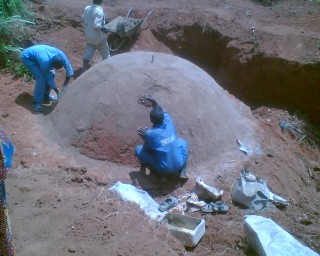 RHEPITechn...2009.jpg
(Filesize: 28KB)
RHEPITechn...2009.jpg
(Filesize: 28KB)
-
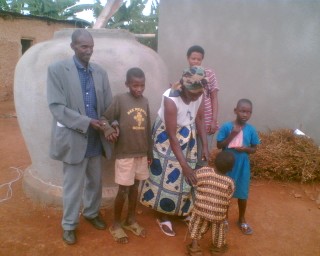 RHEPIWater...iary.jpg
(Filesize: 23KB)
RHEPIWater...iary.jpg
(Filesize: 23KB)
-
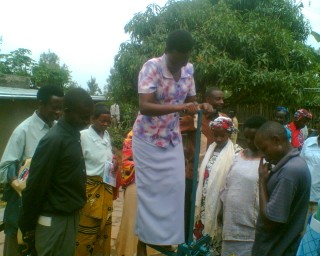 womenlearn...tion.jpg
(Filesize: 28KB)
womenlearn...tion.jpg
(Filesize: 28KB)
-
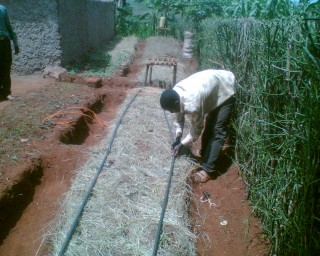 AFarmerlay...tion.jpg
(Filesize: 35KB)
AFarmerlay...tion.jpg
(Filesize: 35KB)
-
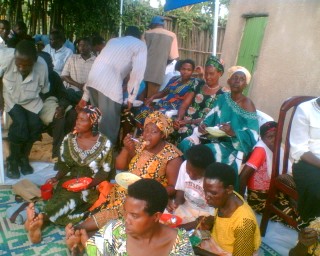 40320x256.jpg
(Filesize: 35KB)
40320x256.jpg
(Filesize: 35KB)
Please Log in to join the conversation.
You need to login to reply
Thanks Marijn. These are excellent suggestions that we can add to the current list.
However, more important right now, at least from my point of view, would be to get some pragmatic feedback on which of the identified issues are actually feasible outputs for WG5 for the coming months/year, and to get some concrete commitments from partners who are willing to contribute time and resources to tackle some of the identified issues. Otherwise we just end up with a beautiful 'wish list'.
Therefore I would like to use this opportunity again to remind all of us, that any potential WG5 deliverable would depend on concrete commitments from the WG5 partners.
Best
rob#
However, more important right now, at least from my point of view, would be to get some pragmatic feedback on which of the identified issues are actually feasible outputs for WG5 for the coming months/year, and to get some concrete commitments from partners who are willing to contribute time and resources to tackle some of the identified issues. Otherwise we just end up with a beautiful 'wish list'.
Therefore I would like to use this opportunity again to remind all of us, that any potential WG5 deliverable would depend on concrete commitments from the WG5 partners.
Best
rob#
Robert Gensch
Senior Project Coordinator - Capacity Development
German Toilet Organization
Phone: +49-(0)30-41934345
Email: This email address is being protected from spambots. You need JavaScript enabled to view it.
www.germantoilet.org
www.washnet.de
Senior Project Coordinator - Capacity Development
German Toilet Organization
Phone: +49-(0)30-41934345
Email: This email address is being protected from spambots. You need JavaScript enabled to view it.
www.germantoilet.org
www.washnet.de
Please Log in to join the conversation.
You need to login to reply
Dear Rob and other WG 5 members.
To liven up this post a bit, here some ideas for work that I think would be interesting for us to look at.
1.) In general the how and why of urine use (direct application) has been described quite well by various publications now. The only gap I see here is the matter of pharmaceuticals, I think to really get the picture complete we need some research into how well these compounds break down in soil and into whether active ingredients can end up in our food.
2. I would like to see some harmonisation with the organic vegetable movement. I am trying to plough through the new IFOAM documentation to see what their take on use of human waste is. My reasoning here is that if we can make re-use of human excreta exepted as organic there is a lot of potential. In South Asia a crop of eggplant is sprayed with pesticides more the 60 times! There is growing awareness among a fast growing middle class in India that this is not good, I think we will get a boom in organic (or at least pesticide free) crops on the subcontinent and in China.
3. I would like to see a publication on the use of faeces and bio-gas sludge (I have a feeling there may be one in the works as we speak). Somehow we have all concentrated on urine the last years (or so it seems) so now time to get to grips with the shit.
4. I think we should expand in the direction of other forms of solid waste as well. This is also a part of sanitation and there are many forms of waste that can be composted or added to compost to create good fertilisers and soil ammandments. I think here also we should link up with organic farming movements and look into liquid organic fertilisers (made with vermi composting systems) and to look for ways to include human waste. (TPS and urine composting are good examples of this line of work.)
5. We need more large scale projects in the developed world. People in developing countries look at us and form their ambitions. If Ecosan is not made to work in Europe at any scale, I think it will never be truely sustainable in the developing world.
6 I think the ultimate project would be to equip a housing development of about 100 households with UD toilets and waste segregation. Then have a farm nearby and see how much food we can grow only using the various wastes and nutrients recovered from grey water as fertiliser inputs. Essentially the aim would be to see what percentage of our 100 households we could feed using their waste (I do not think we should make it compulsory for the people who's waste we use to also eat our farm produce, it could be sold to the general market).
I hope this gets some responses.
Regards
Marijn Zandee
To liven up this post a bit, here some ideas for work that I think would be interesting for us to look at.
1.) In general the how and why of urine use (direct application) has been described quite well by various publications now. The only gap I see here is the matter of pharmaceuticals, I think to really get the picture complete we need some research into how well these compounds break down in soil and into whether active ingredients can end up in our food.
2. I would like to see some harmonisation with the organic vegetable movement. I am trying to plough through the new IFOAM documentation to see what their take on use of human waste is. My reasoning here is that if we can make re-use of human excreta exepted as organic there is a lot of potential. In South Asia a crop of eggplant is sprayed with pesticides more the 60 times! There is growing awareness among a fast growing middle class in India that this is not good, I think we will get a boom in organic (or at least pesticide free) crops on the subcontinent and in China.
3. I would like to see a publication on the use of faeces and bio-gas sludge (I have a feeling there may be one in the works as we speak). Somehow we have all concentrated on urine the last years (or so it seems) so now time to get to grips with the shit.
4. I think we should expand in the direction of other forms of solid waste as well. This is also a part of sanitation and there are many forms of waste that can be composted or added to compost to create good fertilisers and soil ammandments. I think here also we should link up with organic farming movements and look into liquid organic fertilisers (made with vermi composting systems) and to look for ways to include human waste. (TPS and urine composting are good examples of this line of work.)
5. We need more large scale projects in the developed world. People in developing countries look at us and form their ambitions. If Ecosan is not made to work in Europe at any scale, I think it will never be truely sustainable in the developing world.
6 I think the ultimate project would be to equip a housing development of about 100 households with UD toilets and waste segregation. Then have a farm nearby and see how much food we can grow only using the various wastes and nutrients recovered from grey water as fertiliser inputs. Essentially the aim would be to see what percentage of our 100 households we could feed using their waste (I do not think we should make it compulsory for the people who's waste we use to also eat our farm produce, it could be sold to the general market).
I hope this gets some responses.
Regards
Marijn Zandee
Marijn Zandee
E: This email address is being protected from spambots. You need JavaScript enabled to view it.
E: This email address is being protected from spambots. You need JavaScript enabled to view it.
The following user(s) like this post: Elisabeth, Doreen
Please Log in to join the conversation.
You need to login to reply
Thanks Arno! Very good suggestion! Will get in contact with the organizing committee in the coming days.
Best
rob#
Best
rob#
Robert Gensch
Senior Project Coordinator - Capacity Development
German Toilet Organization
Phone: +49-(0)30-41934345
Email: This email address is being protected from spambots. You need JavaScript enabled to view it.
www.germantoilet.org
www.washnet.de
Senior Project Coordinator - Capacity Development
German Toilet Organization
Phone: +49-(0)30-41934345
Email: This email address is being protected from spambots. You need JavaScript enabled to view it.
www.germantoilet.org
www.washnet.de
Please Log in to join the conversation.
You need to login to reply
Thanks Robert. Regarding next year's World Water week. It is strategic to as soon as possible try to organise a mainstream session (ie not only a side event). This would require contacting SIWI's organising committee.
Arno Rosemarin PhD
Stockholm Environment Institute
This email address is being protected from spambots. You need JavaScript enabled to view it.
www.sei.org
www.ecosanres.org
Stockholm Environment Institute
This email address is being protected from spambots. You need JavaScript enabled to view it.
www.sei.org
www.ecosanres.org
The following user(s) like this post: Doreen
Please Log in to join the conversation.
You need to login to reply
Dear all (and particularly the working group 5 members),
May I initiate a brief discussion here on what you think the SuSanA working group 5 (productive sanitation & food security) should be focussing and working on in the coming months/years. Right now the only concrete deliverable that is foreseen is an overhaul of the current fact sheet version (also meant as a gentle reminder to all of you to actively contribute to this new fact sheet version by giving constructive feedback or by offering support in rewriting some of the chapters --> see related SuSanA forum topic).
However, we would also like to know if there are other potential (and realistic) tasks, deliverables, outputs you feel this group should/could work on. Some initial discussions already took place during the last working group meeting in Stockholm (Aug. 2011) and some of the ideas that emerged are listed below:
- Do-it-yourself kit on treatment/transformation/reuse of different sanitation products
- Seminars at agriculture conferences rather than water/sanitation conferences
- Policy brief on legal framework related to reuse issues
- Document on business potential for entrepreneurs/investors (reuse potential/possibilities/scenarios)
- Contextualizing/simplifying the WHO guidelines ('translating' the WHO guidelines into clear and easy to understand recommendations on how to reduce reuse-related health risks)
- Generic urine guide (not focussing on urine use as a liquid fertilizer only, but rather a document that looks into all ways of exploiting the nutrient value of urine (e.g. TPS, struvite, urine composting, filtering it through feces etc.))
- Document on different sanitation products (incl. agro-characteristics of different flowstreams/products, what influences quality, (re)use examples)
- Inventory of existing/ongoing research and project implementations in the WG5 section of the SuSanA homepage
Any feedback and further ideas from the group are highly appreciated. However, even more important than just identifying potential issues, tasks and deliverables is to get some feedback on how you think this could be achieved and to identify potential contributions from the SuSanA partners (e.g. in-kind, contributing time, taking over a deliverable partly or fully as part of individual organizations/institutions agenda, financial contributions etc.).
In addition: If any of the SuSanA WG5 partners already have publications/activities in the pipeline that are related to productive sanitation and reuse issues and where support from the WG5 could be useful or where the WG5 could provide a potential platform for discussion/dissemination etc. please kindly let us know as well.
And last but not least, fyi: We have been informed that next years 2012 Stockholm World Water Week will focus on 'Water and Food Security' or 'Water and Agriculture' which is an excellent opportunity for our WG5 to make use of it and organize for a side event or seminar. In addition we would also like to encourage all of you to send in related papers.
Thank you very much in advance for you valuable inputs and looking forward to an active discussion
rob#
May I initiate a brief discussion here on what you think the SuSanA working group 5 (productive sanitation & food security) should be focussing and working on in the coming months/years. Right now the only concrete deliverable that is foreseen is an overhaul of the current fact sheet version (also meant as a gentle reminder to all of you to actively contribute to this new fact sheet version by giving constructive feedback or by offering support in rewriting some of the chapters --> see related SuSanA forum topic).
However, we would also like to know if there are other potential (and realistic) tasks, deliverables, outputs you feel this group should/could work on. Some initial discussions already took place during the last working group meeting in Stockholm (Aug. 2011) and some of the ideas that emerged are listed below:
- Do-it-yourself kit on treatment/transformation/reuse of different sanitation products
- Seminars at agriculture conferences rather than water/sanitation conferences
- Policy brief on legal framework related to reuse issues
- Document on business potential for entrepreneurs/investors (reuse potential/possibilities/scenarios)
- Contextualizing/simplifying the WHO guidelines ('translating' the WHO guidelines into clear and easy to understand recommendations on how to reduce reuse-related health risks)
- Generic urine guide (not focussing on urine use as a liquid fertilizer only, but rather a document that looks into all ways of exploiting the nutrient value of urine (e.g. TPS, struvite, urine composting, filtering it through feces etc.))
- Document on different sanitation products (incl. agro-characteristics of different flowstreams/products, what influences quality, (re)use examples)
- Inventory of existing/ongoing research and project implementations in the WG5 section of the SuSanA homepage
Any feedback and further ideas from the group are highly appreciated. However, even more important than just identifying potential issues, tasks and deliverables is to get some feedback on how you think this could be achieved and to identify potential contributions from the SuSanA partners (e.g. in-kind, contributing time, taking over a deliverable partly or fully as part of individual organizations/institutions agenda, financial contributions etc.).
In addition: If any of the SuSanA WG5 partners already have publications/activities in the pipeline that are related to productive sanitation and reuse issues and where support from the WG5 could be useful or where the WG5 could provide a potential platform for discussion/dissemination etc. please kindly let us know as well.
And last but not least, fyi: We have been informed that next years 2012 Stockholm World Water Week will focus on 'Water and Food Security' or 'Water and Agriculture' which is an excellent opportunity for our WG5 to make use of it and organize for a side event or seminar. In addition we would also like to encourage all of you to send in related papers.
Thank you very much in advance for you valuable inputs and looking forward to an active discussion
rob#
Robert Gensch
Senior Project Coordinator - Capacity Development
German Toilet Organization
Phone: +49-(0)30-41934345
Email: This email address is being protected from spambots. You need JavaScript enabled to view it.
www.germantoilet.org
www.washnet.de
Senior Project Coordinator - Capacity Development
German Toilet Organization
Phone: +49-(0)30-41934345
Email: This email address is being protected from spambots. You need JavaScript enabled to view it.
www.germantoilet.org
www.washnet.de
Please Log in to join the conversation.
You need to login to reply
Share this thread:
- SuSanA working groups and regional chapters
- Working Group 5 (Food security and productive sanitation)
- New tasks and deliverables for WG 5
Recently active users. Who else has been active?
Time to create page: 0.252 seconds








